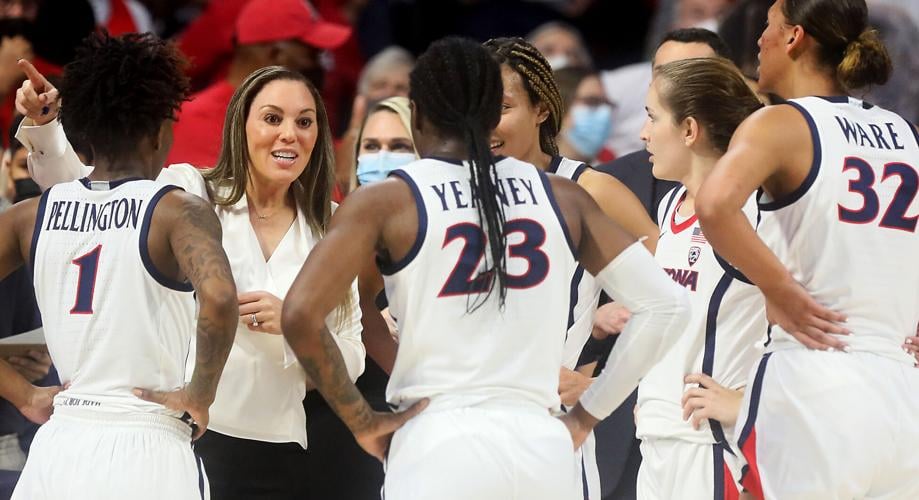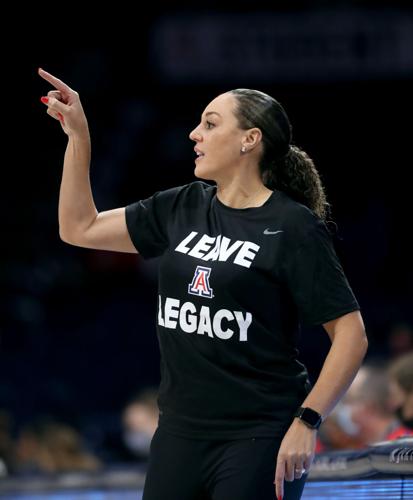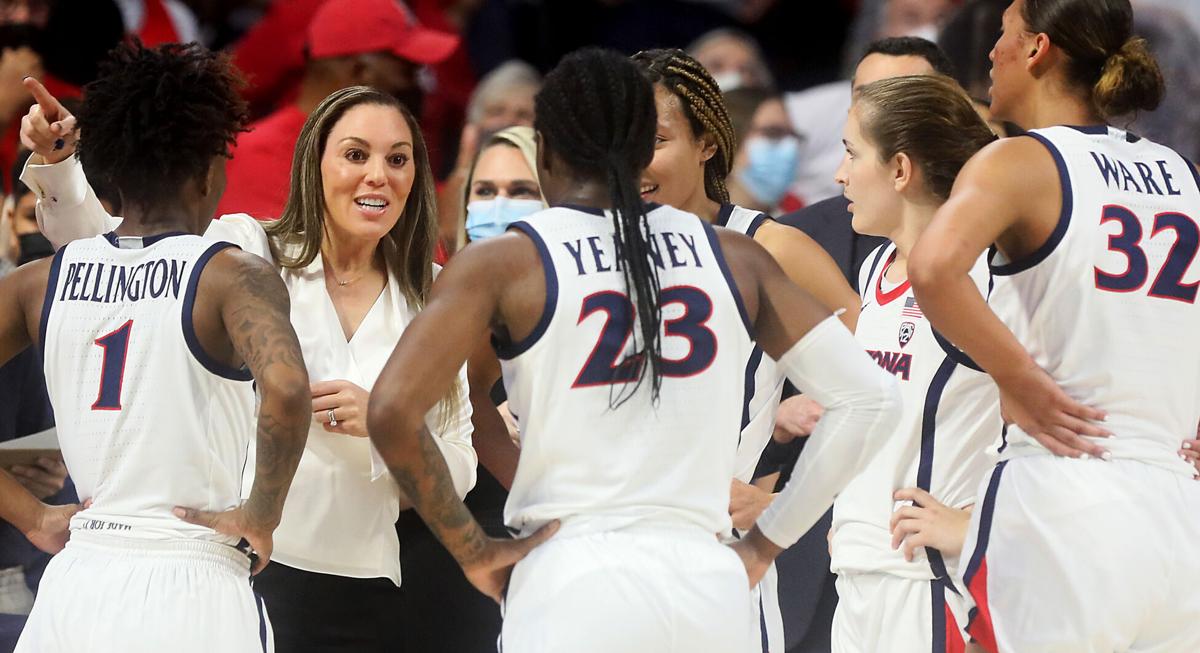Adia Barnes has experienced a lot of change in her lifetime.
As a Mission Bay High School star in San Diego, Barnes didn’t know she could one day play professional basketball. Four years later, Barnes embarked on a pro career that included winning a WNBA championship. She then went into coaching, first as an assistant at Washington and then as the head coach at her alma mater. Barnes is now the first woman coach in UA sports history to make $1 million a year.
The progress Barnes has witnessed is directly related to Title IX, the legislation that gave women the right to equal access to sports in school settings while providing protections — including an education free from discrimination.
The law turned 50 this week. The Star talked to Barnes about the investment in women’s sports, what the next step in equity looks like, and what things might look like when her nearly 2-year old daughter, Capri, grows up. The conversation has been lightly edited.
There was no WNBA when you were growing up. What did the 15- or 16-year-old Adia want to do after you finished college?
A: “That was a long time ago. I just thought I’d go into a profession and get a job. Here was no thought to play profession professional sports. I didn’t even know if I was good enough to play in college, because I was just starting to get serious with basketball. I just didn’t know. There were no really powerful female role models to look up to. It was just, do what you do and go to college. I don’t really have a plan.”
You get the opportunity to play at Arizona and around the same time that you are a freshman, the 1996 Olympic women’s basketball ‘Dream Team’ is happening. And they announce that they’re going to start the WNBA. How does this change your life? Did you did you know even that all this was happening?
A: “I had no idea, just because you’re not following that as a student-athlete. It was my junior year in college that the ABL formed. And then there was talk about the WNBA the next year. There was a pool to see if you go ABL or WNBA. I remember (former WNBA coach) Brian Agler was recruiting me to the ABL because you could make more money in the ABL. But the WNBA was more attractive because it had better marketing and had backing of the NBA. Before the WNBA, I was never going to go overseas and play basketball. … I didn’t know what I wanted to do next. I hadn’t done anything else. I had never had another job; I had only played basketball. It was cool to have that opportunity and pursue it more when I knew it was a possibility.”
You were part of a generation that was among the first to really take advantage of Title IX and investments in professional women’s sports. What was it like to experience this?
A: “I never thought that during my lifetime there would be a professional women’s league. I just didn’t think it would ever happen. I think Title IX helped. The funny thing is people ask about equality with that. When (the WNBA) started it wasn’t a thought, ‘Oh you only get $50,000.’ I think I only made $39,500 my first contract. It wasn’t a thought like, ‘Oh well, the men, they’re going to make $400,000.’ But it was more like, ‘Wow, we have an opportunity to do something in the States.’ It wasn’t even a comparison. It was just like, ‘Wow! This was created and it’s invested in from the NBA.’ There was more of like a thankful thing. I think that’s how we’ve thought for so many years because you were just thankful to have opportunities versus you weren’t thinking about equality because you were never going to get it. You thought, ‘Wow! We have an opportunity to do something.’ It was a different mindset that I look back on. It wasn’t even a thought (to ask for any type of equity). Or I look back to the inequalities in college and you don’t even look at them to know, because you’re thankful for getting something. I think that’s been the mentality for women for a long time.”
What’s it like for you to watch players — like your friend, Sue Bird — push for higher WNBA salaries and private planes?
A: “There’s no doubt they should fly on private planes. I think it’s ridiculous. When I see people like (WNBA star) Liz Cambage having to spend their money to sit (in an upgraded commercial seat) — we’re talking, like, 6-foot-9-inch women. You would never have a men’s team do that. But then, on the flip side, if you need $10 million, and it makes the league fold? I don’t know if that’s worth it. It’s just difficult. Where does the money come from? Who pays for it? Do they make money? I don’t know the finances. I think if they did (have it), they probably already do it. I remember times when we were in the WNBA and there’s like a back-to-back (games) and you have flight problems, you’d still had to play. … I don’t know the solution. I don’t know where the money would come from, but I think professional sports should have that with the way you play. If you played once a week, I think it’s different. But the back-to-back to back, I think it’s hard on their body.”
The University of Arizona hosted trailblazers and community members Thursday for a day-long celebration of the federal law that provides women equal opportunity to college athletics. The school's celebration of the golden anniversary of Title IX — a section of the Education Amendments — fell on the 50th anniversary of the day Title IX was signed into law: June 23, 1972. Celebrations included speeches, a lunch and sports/activities for kids. Pascal Albright / Arizona Daily Star
There has been a lot of change in the salaries of women coaches in the last five years. Former UA softball star Jenny Dalton-Hill mentioned that in 1999 she was offered $11,000 to be an assistant coach at Kentucky. She didn’t take the job because she couldn’t pay for childcare for her children. Now women’s basketball coaches, like you, Dawn Staley, Tara VanDerveer and others are making $1 million a year and up. What are you seeing in pay equity and what else needs to be done?
A: “It was not like this even a short time ago. Even coaches like (Hall of Famer) Debbie Ryan and all those coaches weren’t making this money. But it’s funny: When the salaries came up, more men started coaching women’s basketball. I think it’s still not even comparable (with men’s basketball). I think a good example was done at South Carolina. (Dawn Staley) had the dominant program, much more success and then (Lamont Paris) came in (and got paid) a lot more, but then she got equal pay. … She deserves it. But if Tara VanDerveer was a man, she’d make probably $12 million a year. I think that that’s kind of the way it is. Twenty years ago, Tara probably didn’t even make half a million. I think it’s changing, but it takes time — and I think the whole infrastructure of the of the NCAA has to change with the revenue sharing. You have to let people invest in and I think it’s all business. You make people invest money, it’s a better product. They make more money, and you spend more money. I think it’s there’s just so many facets of it, but I think there’s momentum now and people need to take advantage of the time and the 50th anniversary of Title IX this year. I think it’s time to make changes. I think it could be forgotten in five years.”

Adia Barnes has led the Wildcats to two consecutive NCAA Tournaments, advancing to the national championship game in 2021.
Do you share with your players how far things have come for women and how much there still needs to be done?
A: “I do. I talk about how we had community showers when I was going here. A tiny locker room — one space with all the lockers. It’s completely different. We had nothing like our girls have today. But they have no idea of anything else. … I didn’t experience what other people had, like having car washes to raise money for a tournament. I think that you have to teach the players what happened before because most of them don’t know. … I think if you look at most teams across the country, it’s not equal. The facilities, what men get — I think there’s some statistics, but they’re pretty glaring. But I don’t sit here and compare because what we have is so much more than what I had. It’s just hard: You have to appreciate it, but then it’s not where it needs to be. That’s a hard space. If you go through comparing everything, you’ll be miserable because it’s not comparable. It’s not equitable. You can be mad every day or you can try to win, do your best and pick your battles. I think it’s hard. I think a lot of it comes down to finances. … The bottom line is, people watch men’s basketball more than women’s basketball. And that’s the reality.”
You tweeted that your daughter Capri will have more opportunities that you or your mom did. What is your hope for Capri?
A: “I hope when she grows up, she has equal pay. I think this is a world thing. I don’t think women should make less than men. I don’t think a woman doing the same job with the same credentials and the same experience and the same qualifications — I don’t think she should make less money. I think that’s just sexist. I don’t even know how that’s possible. … I think women need to talk about it. I think the powerful men that have these kick-ass women need to talk about it. My daughter is going to be raised to be independent, confident, driven, bossy — I don’t give a darn if she’s bossy when she’s little. She’s going to be bossy, because bossy is bad. If someone calls her bossy, I’m going to be like, ‘Good.’ That’s the way she is going to be raised, because I understand how things are in the field I’m in. (Son) Matteo is going to be raised to respect, support, empower and understand what that looks like and to elevate women. He’s going to see that and he’s going to learn that, because I’m going to teach it. It’s very important to me. I hope that when she’s older, it’s not an issue. I hope that women are making the same as the men are an NBA. I don’t know if I’ll ever live to see that. But I hope that’s the reality.”
Photos: UA celebrates the 50th anniversary of Title IX
UA celebrates 50th anniversary of Title IX
Updated
Arizona women's basketball player Lauren Ware, in gray left, yells "Bear Down!" with a group of kids after finishing a yoga demonstration during Thursday's 50th Anniversary celebration of Title IX at the Cole and Jeannie Davis Sports Center.
UA celebrates 50th anniversary of Title IX
Updated
From left to right, Women's Basketball Head Coach Adia Barnes, Arizona Softball star Jenny Dalton-Hill, Arizona Sports Hall of Fame inductee Kathy Krucker, Softball Head Coach Caitlin Lowe and NCAA Women of the Year recipient Lacey Nymeyer John laugh during a panel discussion for The University of Arizona Athletics 50th Anniversary celebration of Title IX at the Cole and Jeannie Davis Sports Center in Tucson, Ariz. on June 23, 2022.
UA celebrates 50th anniversary of Title IX
Updated
Adison Yeoman, 6, kicks a soccer ball for a goal during the kids field day activities for The University of Arizona Athletics 50th Anniversary celebration of Title IX at the Cole and Jeannie Davis Sports Center in Tucson, Ariz. on June 23, 2022.
UA celebrates 50th anniversary of Title IX
Updated
Avery Francis, 10, right, high-fives Arizona Softball utility Allie Skaggs while playing a throwing game during The University of Arizona Athletics 50th Anniversary celebration of Title IX at the Cole and Jeannie Davis Sports Center in Tucson, Ariz. on June 23, 2022.
UA celebrates 50th anniversary of Title IX
Updated
Sara Marose, 7, left, laughs while playing with Arizona Softball infielder Sophia Carroll during The University of Arizona Athletics 50th Anniversary celebration of Title IX at the Cole and Jeannie Davis Sports Center in Tucson, Ariz. on June 23, 2022.
UA celebrates 50th anniversary of Title IX
Updated
Joesph Montijo, 8, right, plays with a football while other kids find a ball to play with during The University of Arizona Athletics 50th Anniversary celebration of Title IX at the Cole and Jeannie Davis Sports Center in Tucson, Ariz. on June 23, 2022.
UA celebrates 50th anniversary of Title IX
Updated
Former Arizona softball star Jenny Dalton-Hill gets a little emotion while talking about former coach Mike Candrea’s impact on her career during her speech for the university’s 50th anniversary celebration of Title IX at the Cole and Jeannie Davis Sports Center on June 23, 2022.
UA celebrates 50th anniversary of Title IX
Updated
Arizona Women's Basketball commit Maya Nnaji, left, plays "Duck, Duck, Goose" with a group of kids and volunteers during The University of Arizona Athletics 50th Anniversary celebration of Title IX at the Cole and Jeannie Davis Sports Center in Tucson, Ariz. on June 23, 2022.
UA celebrates 50th anniversary of Title IX
Updated
Jolene Streater, 9, left, tries to score a goal on Wilbur during The University of Arizona Athletics 50th Anniversary celebration of Title IX at the Cole and Jeannie Davis Sports Center in Tucson, Ariz. on June 23, 2022.
UA celebrates 50th anniversary of Title IX
Updated
From left to right, Women's Basketball Head Coach Adia Barnes, Arizona Softball star Jenny Dalton-Hill, Arizona Sports Hall of Fame inductee Kathy Krucker, Softball Head Coach Caitlin Lowe and NCAA Women of the Year recipient Lacey Nymeyer John laugh during a panel discussion for The University of Arizona Athletics 50th Anniversary celebration of Title IX at the Cole and Jeannie Davis Sports Center in Tucson, Ariz. on June 23, 2022.
UA celebrates 50th anniversary of Title IX
Updated
Arizona Softball Head Coach Caitlin Lowe, right, answers a question during the panel discussion for The University of Arizona Athletics 50th Anniversary celebration of Title IX at the Cole and Jeannie Davis Sports Center in Tucson, Ariz. on June 23, 2022.
UA celebrates 50th anniversary of Title IX
Updated
Isadora Phillips, 7, left, and her sister Esmerelda Phillips, 7, check out the decorated donuts during The University of Arizona Athletics 50th Anniversary celebration of Title IX at the Cole and Jeannie Davis Sports Center in Tucson, Ariz. on June 23, 2022.
UA celebrates 50th anniversary of Title IX
Updated
Sara Marose, 7, makes a Bens Bells bead during The University of Arizona Athletics 50th Anniversary celebration of Title IX at the Cole and Jeannie Davis Sports Center in Tucson, Ariz. on June 23, 2022.






